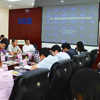- 当前位置:
- 首页>
- 活动>
- ������������
������������
CCG持续关注国际关系议题,推动中国与全球化的发展,积极开展国际交流,充分发挥智库“二轨外交”作用,在巴黎和平论坛、达沃斯世界经济论坛、慕尼黑安全会议等重要国际政策与意见交流平台上组织分论坛、边会、圆桌会议、晚宴等活动,促进国际政商学界对话,凝聚共识;CCG积极与各国政界、智库界、工商界开展“二轨外交”活动,每年常态化赴多国调研与交流,促进中外关系攸关方互动,保持与多国政策圈层的沟通渠道。
-

【媒体报道】智库专家谈印度制造:西方对印度很失望
日前,中国与全球化智库(CCG)在北京总部举办“一带一路投资挑战与机遇系列研讨会之南亚篇”,会上专家就“一带一路”在南亚的投资情况进行了讨论。 CCG主任、商务部中国国际经济合作学会副会长王辉耀教授在研讨会上强调了一带一路战略中人才与智库建设的重要性。他表示,一带一路作为中国构想的提出,智库要先行,国际智库之间要建立研讨渠道和平台,智库也要为国内学者搭建平台。他同时强调了人才对于一带一路建设的重要性。“世界500强里大量的高管是印度人,中关村也可以利用印度人才,要加强南亚的留学。” CCG一带一路研究所副所长储殷认为,发展旅游业是在印度投资的可行性手段。“在印度做实业很困难,建议在印度搞旅游产业,对印度来讲,不仅是走出去,还要引进来,以引进来为重点,印度的高等教育质量很高,不主张在印度大规模搞基建。” CCG一带一路研究所执行所长黄日涵谈及目前在南亚投资的机遇。在他看来,南亚有16亿人口,印度作为金砖国家,包括孟加拉国在内,有投资的可能性。“国之心在于民相交,加大旅游产业的发展不失为一个民间交往的途径,要大力发挥华人华侨作用。” 外交学院副教授林民旺谈及中印政治、经济现状。“中印经济数据并不理想,从2012年到现在一直在下降,逆差400多亿。目前在边界问题上中印之间是稳定状态,印度在对待一带一路的态度上既没有同意也没有反对,关系微妙。”他认为,中国企业去南亚需要借鉴欧美的保障机制与法律手续。 国防大学国防经济研究中心副主任刘群认为,南亚问题有三重重要考虑因素:一是安全问题,美国从阿富汗撤军后,完全控制塔利班还需要一定时间,涉及到民族、派别等一系列问题;第二是政治问题,斯里兰卡新总统上台后出现新状况,而斯里兰卡的地理位置又非常敏感;第三是加强文化交流,克什米尔大学正在考虑建立中文系,加强民间企业人文交流。 中国现代国际关系研究员副研究员王世达则强调了斯里兰卡对于中国一带一路战略的意义。“斯里兰卡位置极其重要,斯里兰卡是全方位的平衡外交,美国自从中国提出一带一路战略后,也开始重视斯里兰卡,因此,中国在南亚地区更需要关注美国在斯里兰卡的重新布局。” 西南政法大学世界与中国议程研究院副院长孙立舟分析了中国企业在巴基斯坦投资的优势:“中国人在巴基斯坦受到远超本国国民的保护,中国人可安全做生意。电力是可获得丰厚回报的产业,建筑、医疗也大有可为。” 会上,爱海洋网编辑就中国制造和印度制造是趋于竞争还是互补的问题,向外交学院林民旺教授提问。他表示,中国制造和印度制造之间,从竞争性上来看,印度制造还是偏弱的。在我2013年驻印期间,有几件事情触动了我,让我对印度这个市场有了一些了解,一件事是韩国的浦项集团,浦项在印度发展已经十年,最后因为盈利额太低而退出印度市场。另一件事是沃尔玛,由于印度政府限制沃尔玛参与终端零售,因此沃尔玛在印度只能从事物流领域,导致沃尔玛的退出。这些都是莫迪上台之前的状况。当时给我的感觉就是,美国以及一些西方国家,对印度很失望。 至于中国制造和印度制造之间到底有没有竞争?林民旺表示,可能会有竞争,但更多的是双方合作层面上的东西。不过,印度和中国在很多层面上依然存在着很大的差距,中国制造业发展至今已有很完整的体系。印度制造的产品无论从外观到质量上都与中国的产品有较大差距。往往有些印度制造的国际合资品牌的产品,在质量上也不及国产产品。印度需要更多着眼于税制以及劳动保护等等一些政策本身,这样企业会自动地涌向印度。文章选自爱海洋网,记者:安玮骐
2015年9月1日 -

【China Daily】The restless rich and what to do about them
The latest Forbes report, according to New World Wealth and LIO Global, says about 91,000 high net worth individuals from the Chinese mainland have settled overseas in the last 14 years. The report categorizes the rich on the mainland as anyone with net assets of $1 million, not counting their primary residence, and says most of the mainland’s rich are heading to the United States, Hong Kong, Singapore or the United Kingdom.Why are wealthy Chinese so eager to leave the mainland? Hurun Consultancy, together with the Visas Consulting Group, did some digging and found that the main reasons are quite apolitical. The top three factors driving the millionaires’ desire for emigration, with each accounting for 20 percent, were concerns over their children’s education, pollution and food safety.It is believed that some individuals are making exit plans to escape the recent crackdown on corruption targeting those with ill-gotten wealth. No one in China will miss them but the authorities need to stop them.Americans whose anger at the super-rich is growing because of rising inequality might feel the same about millionaires fleeing higher taxes in the US - unlike their Chinese counterparts, rich Americans migrate mainly to ease their tax burdens.But most of China’s wealthy wannabe expatriates, especially the first-generation rich, made their fortunes honestly by dint of their ability and hard work. These individuals form an invaluable pool of entrepreneurial/business talent that China can ill-afford to lose as it seeks to make markets more important in its economic growth model.To be sure, not all of those expressing a desire to leave will actually do so. Liam Bailey, a researcher with Knight Frank LLP says in a Barclays Report: "Most ultra-high net worth individuals are probably making money in China now. So for business reasons, they need to be relatively close."While such people may stay put, they could transfer more of their wealth overseas. Hurun estimates that from 2012 to 2014, rich Chinese invested 16-19 percent of their wealth abroad.In 2014, China had a service trade deficit of $198 billion, which was widely regarded as new channel of capital outflow. And it is estimated that $300-400 billion of capital outflow this year might hinder China’s ability to prop up its economy.China does have huge foreign exchange reserves, $3.7 trillion to be precise. But Victor Shih, an economist, has noted that the top 1 percent of China’s wealthiest households controls assets equivalent to at least two-thirds of China’s foreign exchange reserves and, he warns, if they moved 30-40 percent of their wealth overseas, they would deplete the country’s reserves by $1 trillion.Improving the environment and education system in China, two of the three main reasons why millionaires wish to leave China, is a difficult and long-term task. But in the meantime, the Chinese government ought to build upon its earlier efforts to boost the safety net for ordinary people in order to increase their incomes and thus expenditure, and lessen inequality. Reducing the concentration of wealth in China would go some way toward making the country less vulnerable to the whims of its restless and footloose rich.The author William Daniel Garst is a research fellow at the Center for China and Globalization.
2015年8月31日 -

【国际在线】中国与全球化智库聚焦南亚 “走出去”机遇与挑战并存
【国际在线消息】今年3月,我国发布了“一带一路”愿景与行动文件。南亚作为“一带一路”战略构想中的重要地区,吸引了众多中国企业的目光。对有意在南亚投资的中国企业来说,有可能遇到哪些风险,又该如何把握机遇呢?8月26号,中国与全球化智库(CCG)一带一路南亚研讨会在北京举行,旨在探讨南亚投资环境,为中国企业出谋划策。 8月26日,中国与全球化智库(CCG)一带一路南亚研讨会在北京举行,这是中国与全球化智库一带一路研究所成立后的第三次研讨会,旨在对中国企业在南亚地区的投资机遇与风险进行探讨。南亚地区是我国“一带一路”战略构想中的重要地区,虽然面临着政治、经济、运营环境和经贸合作等方面的风险,但地理位置、人口基数等方面的优势,仍然对中国企业有着很大的吸引力,也存在着很大的投资机遇。特别是在旅游、人才建设和文化交流方面,双方合作的潜力巨大。在这样的背景下,对于南亚地区的研究也愈发重要。 中国与全球化智库主任王辉耀教授在研讨会上表示,一带一路将以前的内向型开放转变为外向型开放,在具体实施方面,可以打造几个样板国和样板工程。而印度作为发展速度较快、人口基数庞大的金砖国家,投资潜力巨大,具备成为样板国的主要因素。中国与全球化智库一带一路研究所副所长储殷谈到在印度投资时表示,“在印度做实业很困难,但是我们可以先从旅游做起,对印度来讲,绝不仅是走出去,完全可以以以引进来为重点,印度的高等教育质量很高,不主张在印度大规模的搞基建。” 的确,包括印度在内的南亚国家旅游资源丰富,旅游业相对于第一第二产业来说受政策限制、法律手续方面影响较小,发展旅游业是在印度投资的可行性手段。中国与全球化智库一带一路研究所执行所长黄日涵表示,“国之心在于民相交,加大旅游产业的发展不失为一个民间交往的途径,要大力发挥华人华侨作用。” 而在实业投资方面,南亚地区的另一重要国家巴基斯坦被认为是风险较低、收益周期短的理想国家之一。2013年,李克强总理访问巴基斯坦时提出建设中巴经济走廊,加强中巴之间交通、能源、海洋等领域的交流与合作,促进两国互联互通,共同发展。中巴经济走廊是“一带一路”的先行者,该走廊将南亚、中亚、北非、海湾国家紧密联合在一起,巴基斯坦连接欧亚及非洲大陆的战略地位也将得以强化。 更重要的是,由于中巴两国良好的政治关系,当地政府普遍重视中国企业和中国公民,中国人能够相对安全地做生意。同时,巴基斯坦也在积极寻求与中方的合作,中国企业在电力,建筑,医疗领域都将大有可为。对此,清华大学巴基斯坦研究中心副主任孙力舟表示,“电力在巴基斯坦也是非常有潜力的产业,在伊斯兰堡的富人区,每天都要停电3--4次,对中国企业来说,不管是用水电、火电、风电,还是核电,只要能够并网,就可以获得比较丰厚的回报。而且巴基斯坦对于新能源的投资使用,如太阳能发电,有一定的补贴和政策倾斜,是一大优势。” 文章选自国际在线,记者:王鹤立、孙佳宇
2015年8月31日 -

【中国网】林民旺:印度不回应“一带一路”并不代表反对
【中国网讯】2015年8月26日,中国与全球化智库(CCG)在北京总部举办“一带一路投资挑战与机遇系列研讨会之南亚篇”,本次研讨会聚焦南亚,旨在对企业等走出去主体在南亚区域投资风险和机会进行探讨。南亚是我国“一带一路”推进的重要区域,或有可能创造中国周边战略的新范式,因此南亚地区对于推进“一带一路”具有重要意义。 参加研讨会的有CCG主任、商务部中国国际经济合作学会副会长王辉耀教授,外交学院副教授,外交部前驻印度外交官林民旺,北京第二外国语学院法政学院副教授王天星,中国现代国际关系研究员副研究员王世达,西南政法大学世界与中国议程研究院副院长孙力舟,国防大学国防经济研究中心副主任刘群,CCG一带一路研究所执行所长黄日涵,CCG一带一路研究所副所长储殷等学者,以及来自发改委、中巴经济走廊委员会、国家信息中心、天津市政府的相关领导与企业代表、媒体记者。研讨会由CCG执行秘书长苗绿博士主持。 林民旺,外交学院副教授、外交部前驻印度外交官 外交学院副教授、外交部前驻印度外交官林民旺在发言中首先谈到中国在南亚的投资现状。他以印度为例,指出中印的经济数据其实不大理想,从2012年开始到现在一直是下降,去年降到700多亿,逆差是400多亿,中印贸易方面的潜力事实上已经挖掘透了,已经找不到更多的增长点。 林民旺重点谈到中印政治风险。一是中印边界问题。林民旺认为无需过分担忧,中国现在经济各方面的总量已经是印度的5倍,对印度来说边界问题是它的首要问题,很急迫,但是中国不急迫,这是一个大背景;中印之间可能产生政治风险的,一定是边界问题,但边界问题不会引发战争,因为中印签订了四个比较重要的边境管控协议,足以解决边界管控的问题,双方形成了战略稳定态势。一是西藏的问题,因为达赖喇嘛在印度,印度有16万流亡的藏民,会有可能激进化这样的考虑,但至少在习主席任内没有问题。 再一个是印度对“一带一路”的看法,林民旺认为,印度没有回应中国的“一带一路”,并不代表他反对,大国不互相买账是一个常态,中国提出后,对印度而言显得他是跟班的角色,所以在言语上印度是不会支持“一带一路”。还有印度对中巴经济走廊也存在顾虑,因为中巴经济走廊经过克什米尔,这是印度与巴基斯坦双方争议的地方,印度可能会有一些破坏的举动,但是印度持续的反对这是一定的。还有中印孟甸经济走廊,这个走廊印度、缅甸都比较难推动。 林民旺指出,中国企业去南亚国家要避免这些所谓的政治风险,就需要借鉴欧美企业,完善投资方式、风险保障机制,了解相关国家的法律程序。文章选自中国网,记者:王琳
2015年8月31日 -

【首席财务官网】保护原创,推动海归创新力度
作为一年一度中国留学人员的盛会,中国留学人员创新创业论坛已成功举办了九届,数千名来自海内外的留学人员参加了历届论坛。作为国内高水准的中国留学人员创新创业的“思想碰撞盛宴”,中国留学人员创新创业论坛已成为沟通海内外高层次人才深度交流思想的盛会,成为国内外创业精英获取最新创业政策与信息、彼此交流的新平台与新机制。 由欧美同学会·中国留学人员联谊会主办,中国与全球化智库(CCG)承办的第十届中国留学人员创新创业论坛于8月16日在北京万达索菲特酒店隆重召开。本届论坛以“大众创业,万众创新”为主题,深入探讨了海内外留学人员如何在促进建设创新型国家、实施“一带一路”战略、开展民间外交等方面发挥自身的优势,开创“海归中国” 创业创新的新局面。该论坛已经成功举办十届,被称作“一年一度中国海归的盛会”,本次论坛再次汇聚国内顶尖海归精英,超过600余名海归精英与会,同时引发社会各界广泛关注,包括新华社、人民网等数百家媒体报道和转载本次盛况。 智联集团首席执行官、智联卓聘创始人、CCG咨询委员会常务理事郭盛在论坛上指出 ,年轻海归难于融入国内环境。要进行创新制度改革,保护原创,创造有利于海归发展的环境。 推动海归创业创新,进行创新制度方面的改革非常重要。他说,要加强执法力度,保护原创性,防止恶习抄袭,创造出一个有利于海归良好的创新环境。 以“大众创业 万众创新”为主题的本次论坛,充分展示了中国最高规格的留学归国人员创业高峰论坛的号召力与影响力。2015年“大众创业、万众创新”高潮迭起,人才强国和创新驱动的战略布局,为广大留学归国人员施展自己的才华提供了难得的机遇和优良的环境。广大海内外留学人员在促进建设创新型国家、实施“一带一路”战略、开展民间外交等历史使命中,必将发挥自身的优势,走出一条风景独好的“海归中国”创业创新之路。 截至2014年底,中国出国留学人数为351.84万人,留学回国人数已达180.96万人,仅2014年一年就有36.48万人回国,相当于2001年回国人数的三十多倍,留学人员工作越来越受到中央的重视,也成为中央人才工作新的着力点。欧美同学会副会长、论坛大会主席王辉耀表示,海归拥有国际的人脉、国际的网络、国际的资本,国际的视野,创业资源丰富,是中国新时期发展的重要推动力量。充分发挥海归纽带和桥梁的作用,将为中国未来的创新带来很大提升。中国正在把海归工作作为中国国际人才工作新的着力点,以加大创业创新的力度,引领全球化时代潮流。 文章选自首席财务官网,2015年8月18日
2015年8月31日 -

【人民网】学者:南亚是我国“一带一路”推进的重要区域
【人民网8月27日电】中国与全球化智库(CCG)26日在北京总部召开了“一带一路投资挑战与机遇系列研讨会之南亚篇”,本次研讨会聚焦南亚,旨在对企业等走出去主体在南亚区域投资风险和机会进行探讨。与会者表示,南亚有16亿人口,位置极其重要,南亚是我国“一带一路”推进的重要区域,虽有安全、政治等问题,但有很大的投资机遇,南亚或有可能创造中国周边战略的新范式,因此南亚地区对于推进“一带一路”具有重要意义。 CCG主任王辉耀教授强调了一带一路战略中人才与智库建设的重要性。他表示,一带一路作为中国构想的提出,智库要先行,国际智库之间要建立研讨渠道和平台,智库也要为国内学者搭建平台。CCG与印尼、孟加拉、新加坡等国智库都有广泛合作。他同时强调了人才对于一带一路建设的重要性。“世界500强里大量的高管是印度人,中关村也可以利用印度人才,加强南亚的留学。” CCG一带一路研究所副所长储殷认为,发展旅游业是在印度投资的可行性手段。“在印度做实业很困难,建议在印度搞旅游产业,对印度来讲,不仅是走出去,还要引进来,以引进来为重点,印度的高等教育质量很高,不主张在印度大规模搞基建。” 南亚有16亿人口,印度作为金砖国家,包括孟加拉国,有投资的可能性。CCG一带一路研究所执行所长黄日涵谈到在南亚投资要发挥华人华侨作用,“国之心在于民相交,加大旅游产业的发展不失为一个民间交往的途径,要大力发挥华人华侨作用。” 外交学院副教授林民旺谈及了中印政治、经济现状,“中印经济数据并不理想,从2012年到现在一直在下降,逆差400多亿。目前在边界问题上中印之间是稳定状态,印度在对待一带一路的态度上既没有同意也没有反对,关系微妙。”他认为,中国企业去南亚需要借鉴欧美的保障机制与法律手续。 国防大学国防经济研究中心副主任刘群认为,南亚问题有三重重要考虑因素:一是安全问题,美国从阿富汗撤军后,完全控制塔利班还需要一定时间,涉及到民族、派别等一系列问题;第二是政治问题,斯里兰卡新总统上台后出现新状况,而斯里兰卡的地理位置又非常敏感;第三是加强文化交流,克什米尔大学正在考虑建立中文系,加强民间企业人文交流。 西南政法大学世界与中国议程研究院副院长孙立舟分析了中国企业在巴基斯坦投资的优势:“中国人在巴基斯坦受到远超本国国民的保护,中国人可安全做生意。电力是可获得丰厚回报的产业,建筑,医疗也大有可为。” 北京第二外国语学院法政学院副教授王天星指出一带一路战略上三个重要问题,即立法、基础数据库建设与智库的作用。 中国现代国际关系研究员副研究员王世达强调了斯里兰卡对于中国一带一路战略的意义。“斯里兰卡位置极其重要,斯里兰卡是全方位的平衡外交,美国自从中国提出一带一路战略后,也开始重视斯里兰卡,因此,中国在南亚地区更需要关注美国在斯里兰卡的重新布局。” 文章选自人民网,记者:张志达
2015年8月31日 -
高瓴张磊:新一代价值投资
张磊,高瓴资本集团董事长兼首席执行官,中国与全球化智库(CCG)咨询委员会副主席。提 要在喧哗的投资世界里,张磊比较低调。自从2005年从耶鲁基金的David Swesen手中获得2000万美金, 他实现了年化~40%的收益。作为对比,巴菲特的年化复合收益~22%,不过保持了50年。今天,Hillhouse管理180亿美金。尽管不是专注技术领域,张磊的成名来自投资了几个最成功的中国互联网企业(腾讯和京东)。以下是他4月29日在哥伦比亚商学院做的投资和人生经验分享。In the high flying world of investing, Lei Zhang maintains a relatively low profile. Yet since he was seeded by David Swesen of Yale Endowment with $20 million in 2005, he has achieved a ~40% compounded annual return (28x not adjusting for inflation), making him one of the best performing investment managers. To put it into perspective, Warren Buffet has achieved a compounded annual return of ~22%, albeit for the past 50 years!! Today, Lei Zhang’s Hillhouse Capital, named after a street nearby Yale where Lei received his MBA and master’s in public policy, manages ~$18 billion. Thought not just focused on tech, Lei is best known for backing several most successful Chinese internet entrepreneurs and start-ups (e.g. Tencent, JD.com). On April 29th, Lei paid a visit to the “Temple of Value Investing” Columbia Business School to share his investing and life lessons. Below are my synthesis of his wisdom:For those who crave for brevity, here is the essence of the lessons that Lei Zhang shared:简短的版本:●Being a long-term investor gives you a big advantage from the starting line.做一个长期的投资者具有巨大的优势。●Do deep fundamental research, make few bets instead of keeping on chasing ideas. This way you simply your life and your business.做基础研究,投资少而精,而不是追逐概念。这会使你的生活和生意简单。●Hillhouse invests in changes and strives to help create value through entrepreneur-like thinking and problem solving. “We are entrepreneurs so happen to be investors”Hillouse投资于变化,通过企业家思维和解决问题创造价值,“我们是创业家碰巧还是投资人"●Spend quality time with quality people, doing quality things. Hopefully part of the outcome is making money.和高质量的人花够时间,做高质量的事情。挣钱是自然而然的结果的一部分。●Stay connected to reality and everyday life, do not become a victim of your own success.不要脱离现实和生活,不要为自己的成功所束缚。●Four most important traits in people that Lei looks for: intellectual curiosity, intellectual independence, intellectual honesty, and empathy.寻找那些有如下特质的人:好奇心,独立思考,诚实,有同理心For those who want more details and articulations, read on: (长版本)1.Investment Strategy (投资策略)●Flexibility – Lei only had one investor in his fund when starting out Hillhouse – David Swensen from Yale Endowment seeded Hillhouse with $20 million. He could have raised more money with Swensen’s endorsement but did not. He wanted to start with a solid foundation, a strategy that allows him 100% flexibility to invest in whatever he believes in and is passionate about, be it public equity, venture capital, or private equity. In Lei’s words “it’s not about the format but about the essence.” To him the essence is to invest in companies that he thinks make sense, truly believes in, run by people who he respects and are open-minded, and could compound capital over a long stretch of time no matter what stage the company is in. In terms of his investment team, Lei believes in a generalist model and prides himself on being one of the analysts.灵活性—开始投资时他只有一个投资人,虽然可以利用Swensen的背书募集更多的钱,他没有这么做。希望可以有100%的灵活性去投资他相信并且有激情的东西,不管是股票,风险投资还是PE。“形式不重要,内容才关键”。他相信通才模式,并以自己是分析师的一员而自豪。●Long Term Orientation – Hillhouse is a long-term investor. Lei thinks that when you have a long-term orientation, from day one you have a huge advantage over most people – it’s what he calls free option value of time arbitrage. His view on the Chinese stock market at the time of this speech? “It’s like 1999 all over again, but times three.” The environment is so bubbly that any company that changes its name into something internet related could get an elevated multiple on their valuations. Some say long-term investing does not work in China because everybody trades so much. Speaking at one mutual fund conference, some managers asked Lei “how do you make so much money despite being a long term investor” (everyone in the room laughed really hard on this comment). Some Chinese mutual fund managers complain to regulators, “I know you want long term investors, but we need to make money, we have a fiduciary duty.” The understanding of long-term investing in China is so distorted, people think there is a cost to being a long-term investor.长期导向—长期投资者有巨大的优势,张磊所谓时间套利的期权价值。现在中国的股市就像1999年,还要乘三倍。任何股票改个名字沾上互联网,估值立即翻几倍。有些人说长期投资在中国不管用,因为大家交易太频繁。●Bias Toward Inaction – But how does Hillhouse find high quality names? The way is to do deep fundamental value research and only research things that could potentially compound value over time. There are many people in China that are successful at trading, but traders have capacity issues because they have to trade all the time. In China, an average portfolio manager has 600% annual turnover, Lei’s public equity portfolio has only 15% turnover and he continues to own his private equity portfolio. Hillhouse does not attempt to constantly chase different horses. In a given year, Hillhouse takes on 2-4 positions at best and sometimes only one. By taking away the action, Lei believes you simplify your life and the investment business, and you let the portfolio compound for you instead of you doing the work. By being patient and not too active, he was able to accumulate a portfolio of high quality names.不活跃投资- 如何找到好质量的公司? 方法是基础研究而且只研究价值长时间能复合增长的领域。在中国,基金经理的组合平均一年流转6次,张磊的只有15%并且继续投资私有公司。Hillhouse不去追逐不同的马。一年最多投2~4个,有时1个。去除了频繁投资,张磊相信生活和投资都会简单化,让投资组合去挣钱而不是自己不停的工作。通过耐心和低频投资,他积累了一个高质量公司的组合。2.Deviation from Traditional Value Investing Philosophies (和传统价值投资哲学的分离)●Investing in changes – Lei Zhang is a big believer in value investing, but where he deviates from the traditional value investing philosophy is that he likes investing in changes. He believes that it is change that derives value and he would like to invest in people driving them. In particular with China, and globally as well, technology has become a bigger part of the game, either in traditional or new industries. Changes are driving forces for creative destruction and value creation. He spends a lot of time understanding the changes and the people behind them. Lei says that one thing about investing in early stage company is that some companies look distracted on the outside, but if you look at the core they are intensely focused. On the other hand, the traditional sense of value investing represented by Warren Buffet dislikes changes and prefers long-term stable businesses with strong moat, hence why Warren ends up with big positions in names like in Coca Cola, Amex, Wells Fargo, and IBM.投资变化—张磊深信价值投资,但与传统价值投资哲学不同,他喜欢投资变化。他认为变化产生价值,并且要投资那些驱动变化的人。特别在中国,技术已经成为游戏更重要的一部分,不管在传统还是新的行业。他花很多的时间研究变化和背后的人。很多早期公司从外面看似乎很分散,内部实际很集中。以巴菲特为代表的传统价值投资不喜欢变化,喜欢有护城河的长期稳定的公司,所以巴菲特的组合是可口可乐,Amex等(插一句,如果Hillouse的管理资金到了巴菲特的程度,投资变化也会是个问题,因为体量不够)●Example 1: Blue Moon and JD.com. Blue Moon is in a traditional business, liquid laundry detergent. Hillhouse would never have invested in it if everything is done the same way, as there is P&G and Uniliver, which you invest in for their brand value and moat. After investing in Blue Moon, Lei arranged its executives to meet with those from JD, having Blue Moon learning about ecommerce from JD and have JD learning about merchandising from Blue Moon. Subsequently, Blue Moon redesigned its detergent packs so that they could fit into JD’s delivery bins. Leveraging social media and ecommerce, Blue Moon achieved the largest brand build up in years and now is the largest liquid detergent brand in China.案例一:投资蓝月亮,撮合蓝月亮和京东,蓝月亮学习电商和社交媒体,在很短的时间里成为最大的品牌。●Value Investing Taken to the Next Level – Lei believes his approach is value investing taken to the next Level. In addition to investing in changes and long-term fundamental value, he also wants to compound that value by participating in the value creation process via deep research. The traditional Ben Graham value mismatch alone is not good enough (current price vs. intrinsic value), he wants to grow that value mismatch over time, not just to take advantage of an arbitrage opportunity. To this end, Lei thinks his approach is more like constructive (or suggestive) activism, though Lei rejects the notion that he is an activist. For him, the traditional sense of activism falls into the category of “life is too short” (too much work and headache? Ackman’s battle with Herbal life comes to mind).更高层次的价值投资—张磊相信他的价值投资更高一个层次。除了投资变化和长期的基础价值,他希望通过参与价值创造过程和深度研究来实现更高的价值。传统的Ben Graham的价值不匹配(价格和内在价值的差异)是不够的,他希望能增长价值,而不是仅仅利用这种价值套利的机会。●Example 2: Strategic partnership between Tencent and JD.com.Lei is an early investor in both companies and brought many senior executives to JD, Tencent was one of one of Hillhouse’s earliest investments and remains in the portfolio. In 2013, Lei saw a new trend – JD had a great retail gene, but was having difficulty confronting mobile commerce on the technology front. On the other hand, Tencent had just acquired an ecommerce business. The core problem is that Pony Ma had never dealt with inventory before and suddenly had lots of physical goods on hand. Lei brought the two companies together, summarizing their problems with one word each, mobile vs. inventory. The solution is for Tencent to hand inventory to JD and JD to hand mobile to Tencent. Pony and Richard hated each other and had been fighting to win the ecommerce war, but the deal just makes all the sense.Through research, Hillhouse was able to present and close the biggest ecommerce deal at the time. In the process, Hillhouse did get diluted, but got a lot of certainty for both companies out of it. The idea is through research, you could present to founders compelling ideas and add value in the process. Through this example, Lei conveyed that he loves entrepreneurs that are confident, open-minded, and willing to learn from competitors.案例二:张磊投资了京东和腾讯,腾讯至今仍然在组合中。 2013年,张磊看到京东有很强的零售基因,但是移动电子商务不强。另一方面,腾讯刚刚收购了易迅,但马化腾从来没有处理过库存。 张磊把两个公司拉倒一起,各用一个词总结了他们的问题:移动VS库存。虽然双方以前互相打,合作对双方有利。通过研究,Hillhouse撮合了但是最大的电子商务交易。虽然其股份稀释了,但是两家公司的确定性增强了。这是研究的价值。张磊喜欢自信,开放同时又喜欢像竞争对手学习的创业家。●Example 3: WeChat moves into Southeast Asia.In Indonesia, for example, Lei helped create a joint venture between Tencent’s WeChat and Global Mediacom, Indonesia’s largest media, television and pay TV conglomerate. At the time, WeChat was behind Facebook Messenger, WhatsApp, and Line in user count, and today has surpassed the first two and is on par with Line. Again, Lei emphasized that he found the opportunity through “research.”案例三:把微信引入印尼,和印尼最大的媒体和电视集团成立合资公司。原文点评:这已经不是研究的问题,而是像创业者那样思考,如他自己所说“我们是创业家碰巧还是投资人”3.What Hillhouse looks for in entrepreneurs and people?(Hillhouse寻找什么样的创业家)Lei finds the most impressive people are the people who have deep passion and execute that passion with discipline, instead of people who exhibit habitual behavior. Specifically Lei looks for four qualities:张磊寻找有激情,并且有纪律性的执行能力的人。Intellectual curiosity – driver of passionHave seen really smart people who are No. 1 in whatever they do, but in the end do not necessarily have the capacity to realize their full potential. The reason is that they are No. 1 not because they want to understand how things work, it’s because they are in the habit of being No. 1. This makes life miserable. If there is no passion in what you do, you will get burned out early on or reach a plateau soon.好奇心: 很多人不管做什么都是第一名,但是却没有成就。他们不是想了解事情怎么工作的,只是习惯性的想得第一。Intellectual independencethis allows a person to grow over long-period of time (I say this is the compounding value of knowledge and wisdom)思考的独立性:这让一个人在很长的时间里可以成长,这是知识和智慧的复合价值。Intellectual honestyBeing authentic and intellectually honest is so important. Lei also does not like people who are overly promotional and who are focused on organizing bureaucracy. At Hillhouse, the team does not do 150-page presentations and sell internally. Repeat your lies 100 times you believe in it yourself.诚实: 真实和诚实很重要。张磊不喜欢过度宣传的人,也不喜欢那些把精力放在组织官僚上人。Hillhouse内部也不做150的PPT来兜售项目。谎说了100次,自己都会相信。Empathy not sympathythe most powerful tool to be a successful entrepreneur or investor is to understand the pain points of consumers, employees, analysts, and entrepreneurs.同理心而不是同情心:理解客户,员工,分析师和创业者的痛If you have the above qualities and a long-term oriented mentality, the rest of it is luck and law of large numbers, do what you are passionate about over and over again, and enjoy doing it over and over again, success will follow in time.如果你有上面的品质,并且有长期奋斗的心态,剩下的只是运气和大数法则问题。一遍一遍做你有激情的事,并且喜欢一遍一遍的做,成功只是时间问题。4. Other lessons from Lei(其他的经验)Don’t say I am going to work for this firm or that firm, don’t get into the argument with yourself. Just ask the simple question, are they the quality people you want to spend time with, who are you working with, working for, what kind of people are they, are they the kind of people who give “positive energy.”不要说我要为这家或那家公司工作,不要和自己理论。问一个简单的问题:你愿不愿花时间和他们或者为他们工作,他们是什么样的人,他们是真能量的人吗?The world has already evolved way beyond the traditional employment relationship but to a more partnership model. It’s all about in what capacity and in what environment you could bring the best of yourself.世界已经从雇佣关系进化到更加合伙关系的模式。要考虑的只是在什么样的环境下你能做最好的自己。Don’t wait for the opportunity to analyze your mistakes, spend 10x more effort trying to analyze your mistakes than success.与其分析成功,不如花10倍的时间分析错误。文章选自MBA俱乐部,2015年8月24日
2015年8月28日